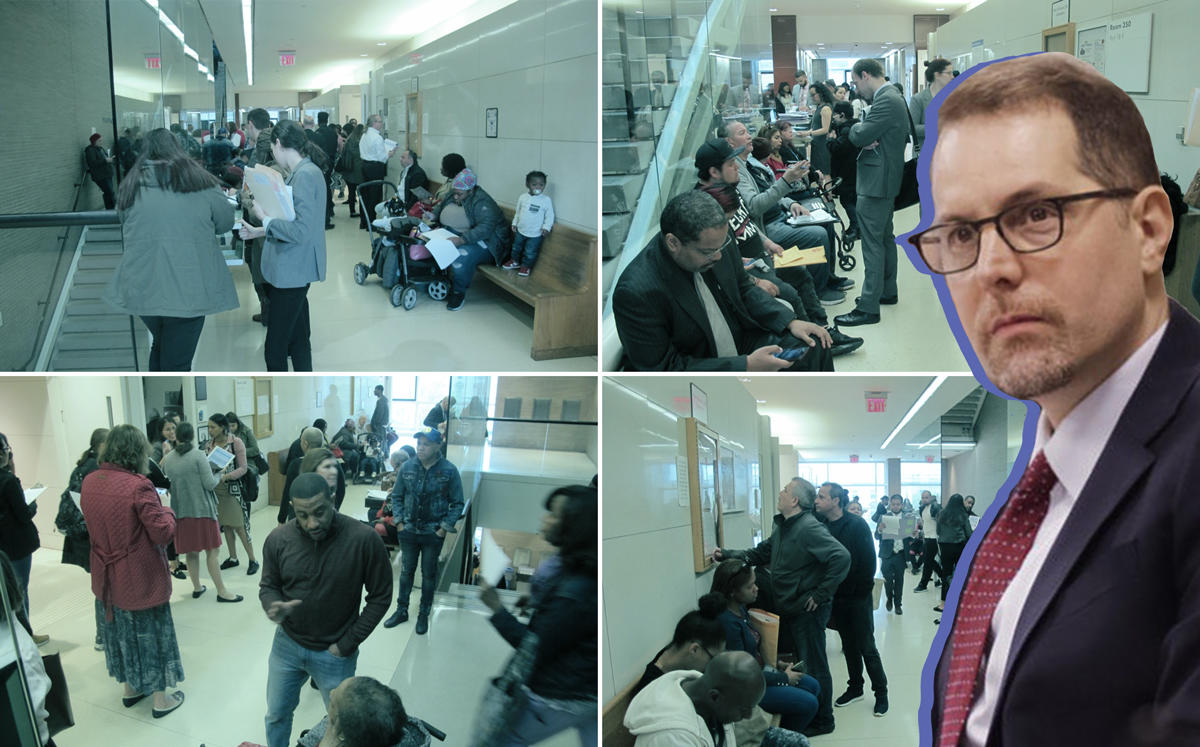Trending
Inside the fight to revamp Right to Counsel
The city’s controversial housing law is working for both landlords and tenants, but some issues still need to be straightened out

The hallways of Bronx Housing Court are crowded and chaotic on a typical weekday morning.
Lawyers and tenants scurry across the white tile floors and lounge on the worn-down benches of the Grand Concourse building, where occasionally the sound of one person shouting out a name will rise above the chatter.
The elevated discussion is usually from an attorney trying to find a tenant facing eviction who they want to assist. Even though New York City passed its Right to Counsel law two years ago guaranteeing that those tenants have the right to legal representation, lawyers still don’t have a better way of contacting the people they’ve been enlisted to help.
Instead, attorneys often just look at a court calendar for a certain date, show up in court and hope their would-be client responds when they call out their name.
“We explain to them that they’re in a Right to Counsel part of the city,” said Matthew Tropp, a Bronx-based lawyer with the Legal Aid Society, explaining the somewhat makeshift process. “If they apply for assistance with us, we can help. They can decline, and sometimes people do.”
Such a haphazard approach to finding potential clients shows that even as the city’s Right to Counsel law enjoys support from individuals on both the landlord and tenant sides of the courtroom aisle, it still needs more institutional support in order to succeed, advocates say.
City Councilman Mark Levine, who spearheaded the legislation, outlined several such concerns in a recent letter to New York’s Office of Court Administration.
“We are deeply concerned that not enough tenants who have the right to counsel know it exists and that those who do are too intimidated to use it,” Levine wrote. “As the five-year roll out continues, and as we move towards expanding the Right to Counsel law, we must be ready for even more tenants [to] take advantage of this program.”
Elation amid litigation
Carmen Garcia said she did not sleep well the night before she was due to appear in housing court on May 2. The Bronx resident was unsure what would happen as she prepared to face eviction over nonpayment at her apartment on Park Avenue in Tremont.
On the morning she arrived at the courthouse, Garcia had no idea someone would be waiting for her. But Amy Helfant was there.
“It’s a relief that she was… I didn’t expect that,” Garcia said about Helfant, a Legal Aid staff attorney. “I have a lot of anxiety,” she continued. “When I saw her, I felt like she was my angel.”
Helfant said she tries to relate to renters by explaining her background in nonprofit legal assistance. Troubled tenants can retain a Legal Aid attorney if they are in one of 20 eligible zip codes. Some tenants balk, believing that Legal Aid representation might not be free or because they want to quickly adjudicate a case. At the other end of the spectrum are those who approach anyone in the courthouse wearing a suit and ask for legal help, Helfant said.
Tropp, her Legal Aid colleague, said a variety of legal service providers handle matters in Bronx Housing Court each day, from Legal Aid to Bronx Legal Services. The providers are currently unable to get advance information about when tenants are scheduled for a court date, hence the ad hoc strategy of just showing up and looking for people in the hallways.
New York passed its Right to Counsel law in 2017, guaranteeing a lawyer to all low-income tenants facing eviction. The law, which should be fully implemented throughout the city by 2022, is currently focused on zip codes covering neighborhoods like Elm Park, Elmhurst, Harlem, Parkchester and Prospect-Lefferts Gardens. Levine hopes to expand the law to also cover small businesses.
Right to Counsel does appear to be having at least some impact on the number of evictions in New York, as city marshals evicted slightly less than 20,000 tenants in 2018, a small decline from the year before when the measure passed, according to data from then-Acting Public Advocate and current City Council Speaker Corey Johnson.
A recent analysis from the Community Service Society of New York found that evictions dropped more than five times faster in zip codes where the Right to Counsel law is now in effect than in areas where it is not. In the zip codes where it has been implemented, Right to Counsel accounts for more than 60 percent of the overall drop in evictions analyzed, according to CSS, a poverty-focused nonprofit.
Increasing assistance
Despite such seemingly impressive numbers, Levine believes that Right to Counsel needs more institutional support to succeed and improve on situations like the one in Bronx Housing Court. The hallway shouting method used by attorneys there, he said, is comparable to the “chaotic scenes” taking place in other boroughs.
Levine outlined additional problems — and proposed solutions — in his letter to the OCA, such as giving tenants instructions on how to contact an attorney prior to their day in court and using mailers to notify tenants facing eviction that they have a right to an attorney.
Lucian Chalfen, a spokesman for the OCA and New York State Unified Court System, said he has reviewed the recommendations in Levine’s letter. “It presents a number of worthwhile ideas that may well make good sense and be practical to implement,” he said.
For his part, Levine is also calling for more outreach to inform tenants they have the right to a lawyer even before they face eviction. Levine claims this will prevent landlords from engaging in unscrupulous practices, such as “working the line” at housing court each morning to offer tenants unfavorable agreements.
“This is all before the tenant has spoken with their attorney and often before the tenant even knows they have access to an attorney,” Levine said. “We need to short-circuit that by having tenants connect with their attorneys before they get to court.”
Judith Goldiner, attorney-in-charge of Legal Aid’s Civil Law Reform Unit, echoed Levine’s claim that some lawyers for landlords still try to work around the Right to Counsel law.
“There’s definitely resistance on the landlords’ side,” she said. “In the Bronx, for example, we see landlords always showing up early and trying to get tenants to sign agreements before they would see a lawyer.”
Strange bedfellows
Opposition to Right to Counsel among landlords, however, is not universal. Levine acknowledged that point in March during a panel discussion about New York’s byzantine rent laws at the Upper East Side’s private Harmonie Club.
“It has been yielding great results,” Levine said before a packed room. “And some of you might not want to admit it, but I have even heard from folks on the landlord side that it is bringing more efficiency to housing court.”

Susan Baumel-Cornicello
Moderator Andrew Dansker of Marcus & Millichap then sought an opinion about Right to Counsel from Susan Baumel-Cornicello, a prominent landlord attorney with New York’s Cornicello, Tendler & Baumel-Cornicello. Her response took the room at the swank Harmonie Club by surprise.
“It’s actually been a plus-plus for our clients,” she said.
“Wow!” Levine responded. “Is this being recorded?”
Baumel-Cornicello then ticked off several positive effects that the law has had for landlords. Court proceedings involving evictions now move faster, with judges freed from performing double duty as tenants’ lawyers, she said. Right to Counsel also gives tenants someone to talk to about their cases who they trust more than their landlords.
Still, there remains a healthy amount of skepticism toward how useful the law is on the landlord side, while many tenant supporters view landlords’ newfound enthusiasm for Right to Counsel’s rules as little more than lip service.
“Landlords have a bad enough name already,” Levine said. “They’re not going to come out against equal representation in high-stakes legal proceedings.”
Baumel-Cornicello said one of the best ways Right to Counsel has helped landlords so far is by giving them easier access to apartments for repairs. Several cases on her docket relate to tenants not paying their rent because they want their landlord to fix something first. Tenants’ attorneys can speed up this process by explaining to their clients that they need to pick a date to let their landlords into their apartments for maintenance, Baumel-Cornicello said.
“We’ve had cases that have gone on and on because we can’t get in to do repairs,” she said. “It’s such a waste of time and money having to go back to court three to four times to just have access to do repairs.”
Former City Councilman Kenneth Fisher, now a partner at the law firm Cozen O’Connor who mostly works with landlords, said that the support for Right to Counsel by both landlords and tenants demonstrates the complexity of the city’s housing laws. He appreciates that the law gives tenants more realistic expectations about what their rights are and helps expedite what can be a sluggish legal process.
“When you have a [pro se] tenant without a lawyer, the judges bend over backwards to make sure that the tenant feels that they’ve been treated fairly, even if they don’t like the outcome, which is time-consuming,” said Fisher, “particularly when you’re dealing with the immigrant population.”
The Rent Stabilization Association, a New York-based trade association representing landlords, had once been extremely critical of Right to Counsel. In a 2017 op-ed in City & State, RSA president Joseph Strasburg described it as a “politically expedient, minimal impact” program that would not effectively address the city’s homelessness crisis.
But Mitch Posilkin, RSA’s general counsel, said the organization now supports the Right to Counsel legislation, pointing to the fact that it levels the playing field and prevents tenants from fighting a verdict by claiming that they were ignorant about their rights. Still, the law is far from a panacea, and Posilkin believes an increase in public rent subsidies would be a more important and effective way of helping low-income tenants.
“The best lawyer in the world is not going to be able to help that tenant if the tenant’s problem is that they don’t have enough money to be able to pay the rent,” he said. “I understand why and how attorneys make a difference. There’s no question. But that’s not the be-all and end-all of the equation.”




